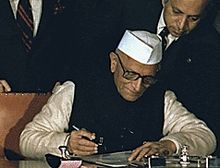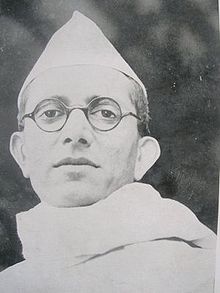- Morarji Desai
-
Morarji Desai
મોરારજી દેસાઈ
Prime Minister of India In office
24 March 1977 – 28 July 1979President Basappa Danappa Jatti (Acting)
Neelam Sanjiva ReddyPreceded by Indira Gandhi Succeeded by Charan Singh Minister of Home Affairs In office
1 July 1978 – 28 July 1979Preceded by Charan Singh Succeeded by Yashwantrao Chavan Deputy Prime Minister of India In office
13 March 1967 – 16 July 1969Prime Minister Indira Gandhi Preceded by Vallabhbhai Patel Succeeded by Charan Singh
Jagjivan RamMinister of Finance In office
13 March 1967 – 16 July 1969Prime Minister Indira Gandhi Preceded by Sachindra Chaudhuri Succeeded by Indira Gandhi In office
13 March 1958 – 29 August 1963Prime Minister Jawaharlal Nehru Preceded by Jawaharlal Nehru Succeeded by Tiruvellore Thattai Krishnamachari Personal details Born 29 February 1896
Bhadeli, British IndiaDied 10 April 1996 (aged 100)
New Delhi, IndiaPolitical party Janata Dal (1988–1995) Other political
affiliationsIndian National Congress (Before 1969)
Indian National Congress-Organisation (1969–1977)
Janata Party (1977–1988)Alma mater Wilson College, Mumbai Profession Civil servant
ActivistReligion Agnostic Morarji Ranchhodji Desai (Gujarati: મોરારજી રણછોડજી દેસાઈ) (29 February 1896 – 10 April 1996) was an Indian independence activist and the fourth Prime Minister of India from 1977–79. He was the first Indian Prime Minister who did not belong to the Indian National Congress. After assuming the office, Desai promoted his policies and peace initiatives between Pakistan and India to avoid conflicts, such as Indo-Pakistani war of 1971. For this, he was conferred with Nishaan-e-Pakistan (Order of Pakistan). Desai is the first Indian national to receive the highest civilian award from Pakistan, the Nishaan-e-Pakistan. Actor Dilip Kumar was the second Indian to receive the Nishaan-e-Pakistan Award.
Contents
Early life
Morarji Desai was born into an Anavil Brahmin family in Bhadeli, Valsad in Bombay Presidency (now in Gujarat). His schooling life is in Bai Ava Bai High Schhol, Valsad. After graduating from Wilson College, Mumbai, he joined the civil service in Gujarat. Later, he left the service of the British in 1924 and joined the civil disobedience movement against British rule in India in 1930. He spent many years in jail during the freedom struggle and owing to his sharp leadership skills and tough spirit, he became a favourite amongst freedom-fighters and an important leader of the Indian National Congress in Gujarat. When provincial elections were held in 1934 and 1937, Desai was elected and served as the Revenue Minister and Home Minister of the Bombay Presidency.
In government
Before the independence of India, he became Bombay's Home Minister and later was elected as Chief Minister of Bombay State in 1952. The state was home to Marathi linguistic movements, with calls for the creation of a separate linguistic state. Considered as a tough leader, Desai was also known for pioneering beliefs and enforcing strict discipline and authority. By Desai's orders in 1960, a demonstration by the Samyukta Maharashtra Samiti was fired upon by the police resulting in the deaths of 105 demonstrators. 105 demonstrators were killed in the incident leading to public outrage that shook the central government. The incident led to the formation of the present State of Maharashtra.
As Home Minister, Desai outlawed any portrayals of indecency (which included "kissing" scenes) in films and theatrical productions. Although a staunch Gandhian, Desai was socially conservative, pro-business, and in favour of free enterprise reforms, as opposed to Prime Minister Jawaharlal Nehru's socialistic policies.
Rising in Congress leadership, Desai was at odds with Prime Minister Nehru and his allies, and with Nehru's age and health failing, he was considered as a possible contender for the position of Prime Minister. Outflanked in the leadership contest after Nehru's death in 1964 by the Nehruvian Lal Bahadur Shastri, Desai remained content to build support within the ranks.
After Shastri's death in 1966, he contested for Prime Minister and fought a closely contested election with Indira Gandhi. Desai obtained 169 votes but lost to Indira Gandhi who garnered 351.
Prime minister
Main article: Premiership of Morarji DesaiMorarji Desai became the prime minister after the landslide victory of the Janata coalition in 1977. The coation, later the janata party, was full of personal and policy friction and thus failed to achieve much owing to continuous in-wrangling and much controversy. With no party in leadership of the coalition, rival groups vied to unseat Desai. Controversial trials of prominent Congress leaders, including Indira Gandhi over Emergency-era abuses worsened the fortunes of his administration. Desai worked to improve relations with neighbour and arch-rival Pakistan and restored normal relations with China, for the first time since the 1962 war. He communicated with Zia-ul-Haq and established friendly relations. Diplomatic relations were also re-established with China. His government undid many amendments made to the constitution during emergency and made it difficult for any future government to impose national emergency.
Since India's first nuclear test in 1974, Desai kept India's nuclear reactors stating "they will never be used for atomic bombs, and I will see to it if I can help it". [1] In 1977, the Carter administration sold India, heavy water and uranium for its nuclear reactors but required American on-site inspection of nuclear materials. Desai declined, seeing the American stance as contradictory, in light of its own nuclear arsenal. [2]
Retirement and death
In 1979, Raj Narain and Charan Singh pulled out of the Janata Party, forcing Desai to resign from office and retire from politics at the age of 83. Desai campaigned for Janata Party in 1980 General Election as a senior politician but did not contest the election himself.
In retirement, he lived in Mumbai, and died at the age of 100. He had been honoured much in his last years as a freedom-fighter of his generation.
Morarji Desai is most often remembered for his championing of Urine Therapy. He told journalist Khushwant Singh that he was advised to try drinking his own urine when in his 40s to cure piles (hemorrhoids), and he got immediate results. Thereafter he continued the practice and was quite open about it, saying that you should not do anything you would be ashamed of.[citation needed]
Morarji Desai was a strict follower of Mahatma Gandhi's principles and a moralist.
Feud with R&AW
Morarji Desai had described the Research and Analysis Wing (R&AW), India's external intelligence agency, as the praetorian guard of Indira Gandhi and had promised to stop all activities of the R&AW after becoming prime minister. He closed down much of the agency, and reduced its budget and operations. B. Raman, the former head of the Counter-Terrorism Division of R&AW and noted security analyst, reveals that, in an unguarded moment, Morarji Desai indiscreetly told Pakistan's Chief Martial Law Administrator General Zia ul-Haq that his government was well aware of Pakistan's nuclear development.[1]
Social Service
Morarji Desai was a true Gandhian follower, social worker, institution builder and a great reformer. He was the Chancellor of Gujarat Vidyapith (university established by Mahatma Gandhi). Even during his term as the Prime Minister he used to visit and stay at Vidyapith during the month of October. He exemplified simplicity and used to write post cards himself even when he held the office of Prime Minister. Sardar Patel deputed him to conduct meetings of farmers in Kaira district which finally led to the establishment of the AMUL Cooperative movement. During his rule, he withdrew intervention in Public Distribution System and rationing shops were literally lost due to cheap sugar and oil available in the market.
Family
Morarji Desai is survived by his son Kanti Desai, two grandsons Bharat and Jaideep Desai and four great grand children. All of whom have no political ambitions besides one of his great grand children, son of Jaideep Desai, Madhukeshwar Desai[2] Who has taken it upon himself to revive the legacy of his illustrious great grandfather.[3]
Vishal Desai, son of Bharat Desai, is an aspiring filmmaker[4] and writer.
References
- ^ "Kaoboys of R&AW: Down Memory Lane" by B.Raman
- ^ "Morarji's 3G to enter politics". DNA. http://www.dnaindia.com/india/report_morarji-s-3g-scion-to-enter-politics_1370053.
- ^ "Morarji's great grandson to revive legacy". The Times of India. http://lite.epaper.timesofindia.com/mobile.aspx?article=yes&pageid=5&edlabel=TOIA&mydateHid=11-04-2010&pubname=&edname=&articleid=Ar00502&format=&publabel=TOI.
- ^ "A lightly carried legacy". The Afternoon. http://www.afternoondc.in/interview/a-lightly-carried-legacy/article_23612.
Political offices Preceded by
Jawaharlal NehruMinister of Finance
1958–1963Succeeded by
Tiruvellore Thattai KrishnamachariPreceded by
Vallabhbhai PatelDeputy Prime Minister of India
1967–1969Succeeded by
Charan SinghSucceeded by
Jagjivan RamPreceded by
Sachindra ChaudhuriMinister of Finance
1967–1969Succeeded by
Indira GandhiPreceded by
Indira GandhiPrime Minister of India
1977–1979Succeeded by
Charan SinghChairperson of the Planning Commission
1977–1979Preceded by
Charan SinghMinister of Home Affairs
1978–1979Succeeded by
Yashwantrao Chavan Prime Minister of India
Prime Minister of India1: Jawaharlal Nehru · 2: Lal Bahadur Shastri · 3: Indira Gandhi · 4: Morarji Desai · 5: Charan Singh · 6: Indira Gandhi · 7: Rajiv Gandhi · 8: V. P. Singh · 9: Chandra Shekhar · 10: P. V. Narasimha Rao · 11: Atal Bihari Vajpayee · 12: H. D. Deve Gowda · 13: I. K. Gujral · 14: Atal Bihari Vajpayee · 15: Manmohan Singh

State of Emergency in India (1975–1977) 
Personalities Indira Gandhi - Jayaprakash Narayan - Siddhartha Shankar Ray - Jivatram Kripalani - Morarji Desai - Atal Bihari Vajpayee - C. N. Annadurai - K. Kamaraj - Periyar E. V. Ramasamy - Harcharan Singh Longowal - Lal Krishna Advani - Charan Singh - Jagjivan Ram - Fakhruddin Ali Ahmed - Sanjay Gandhi - Jagmohan - Bansi Lal - Zail Singh - Dev Kant Baruah - Jagmohanlal Sinha - Hans Raj Khanna - H. N. Bahuguna - Raj Narain - George Fernandes - Neelam Sanjiva ReddyOrganisations Indian National Congress (R) - Janata Morcha - Janata Party - Dravida Munnetra Kazhagam - Dravidar Kazhagam - Indian National Congress (Organisation) - Shiromani Akali Dal - Bharatiya Jana Sangh - Swatantra Party - Bharatiya Lok Dal - Socialist Party of India - Rashtriya Swayamsevak Sangh - Communist Party of India (Marxist) - People's Union for Civil LibertiesEvents State of Emergency in India - State of Uttar Pradesh v. Raj Narain - 39th Amendment - 42nd Amendment - Turkman gate demolition and rioting - Baroda dynamite case - Shah Commission - Maintenance of Internal Security Act - Rajan case - Indian general election, 1977Categories:- 2nd Lok Sabha members
- 3rd Lok Sabha members
- 4th Lok Sabha members
- 5th Lok Sabha members
- 6th Lok Sabha members
- 1896 births
- 1996 deaths
- Desai administration
- Gujarati people
- Janata Party
- Prime Ministers of India
- Recipients of the Bharat Ratna
- Indian anti-war activists
- Indian anti–nuclear weapons activists
Wikimedia Foundation. 2010.


